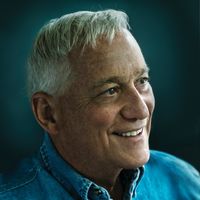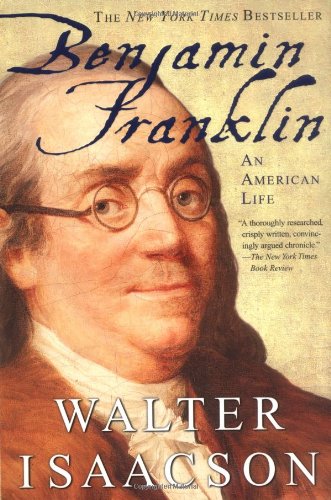Benjamin Franklin Summary
6 min read ⌚
 An American Life
An American Life
If, as Carlyle says, “the history of the world is but the biography of great men,” Walter Isaacson is surely one of the greatest modern historians. And the second man he chose to write about – possibly the greatest figure in American history.
A match made in heaven. And a warm recommendation for every American to read “Benjamin Franklin.”
Who Should Read “Benjamin Franklin”? And Why?
At the end of his biography, Walter Isaacson says that Franklin is “the most accomplished American of his age and the most influential in inventing the type of society America would become.”
So, if you are an American, “Benjamin Franklin: An American Life” should be your compulsory read for this month. However, “the First American” is only one of the things Benjamin Franklin was. Or, to restate this, Isaacson’s biography should prove exciting to historians and political theorists, to scientists and inventors alike.
Finally, this book would be more than an interesting read for anyone keen on learning how exceptional individuals manage to change the world.
About Walter Isaacson
 Walter Isaacson is an American journalist and author. He has been the CEO of CNN and Managing Editor of the “Time” magazine, which, in 2012, voted him one of the 100 most influential people of the world.
Walter Isaacson is an American journalist and author. He has been the CEO of CNN and Managing Editor of the “Time” magazine, which, in 2012, voted him one of the 100 most influential people of the world.
Isaacson is a Professor of History at Tulane University and a major modern biographer. In addition to “Benjamin Franklin,” he has also written biographies about “Einstein,” “Kissinger,” “Leonardo da Vinci” and “Steve Jobs”. We featured the last one on our list of the best 15 biographies in history.
Isaacson has also written “The Innovators” and “The Wise Men,” which, loosely speaking, fall in the genre of “group biographies”.
“Benjamin Franklin Summary”
Benjamin Franklin was… actually, there are two ways to end this sentence. And even Wikipedia couldn’t make the decision – so why should we?
In fact, let’s quote it:
Option #1: “Benjamin Franklin was an American polymath and one of the Founding Fathers of the United States.”
We’ve used that word – polymath – four or five times so far in our summaries, so you already know what it means: a person with a very wide range of expertise. Or, as we would like to say, “a show-off”, or “everything we’ll never be.”
So, what was Benjamin Franklin more specifically?
Option #2: “Benjamin Franklin was a leading author, printer, political theorist, politician, freemason, postmaster, scientist, inventor, humorist, civic activist, statesman, and diplomat.”
But, wait!
It gets even more fascinating:
Benjamin Franklin spent just two years learning at a local school, between the age of 8 and 10. Because, well, that’s how much money his father Josiah had! After all, he had 10 children with Benjamin’s mother! (In addition to the 7 from his previous marriage!)
So, at a very early age, Ben started working as an apprentice under his older brother James, who was a printer. And he was still a teenager when he started to think about owning a business himself.
However, what interested him even more was writing.
While working as a printer’s apprentice, he grew enamored with books such as “The Pilgrim’s Progress” and “An Essay Upon Projects”. And he even tested his skills in his brother’s newspaper, publishing under a female pseudonym, Mrs. Silence Dogood!
At the age of 21, Franklin established the “Leather Apron Club,” probably known to you as “Junto”. It was a group of “like minded aspiring artisans and tradesmen who hoped to improve themselves while they improved their community.”
And no one liked improving himself better than Franklin. He had a curious mind, and he liked to try to understand everything around him.
For example, in his time, many people believed that lighting is something supernatural. However, after witnessing some electricity tricks in Boston in 1743, Franklin did the math and realized that it’s nothing more than an electric discharge.
Scientists adored his brilliant solution via a simple experiment; religious people thought him nothing short of the devil. Hey – even Immanuel Kant blamed him for playing some sort of a god! In fact, he called him “the modern Prometheus.” Fun trivia: that’s exactly how Mary Shelley called Victor Frankenstein!
Just about the same time that he was discovering electricity – and naming “the battery” and “the conductor” – Franklin was shaping the United States. In 1747, he established a private voluntary militia and got an interesting political idea: federalism.
Namely, what if the American colonies had their own local governing laws, but were still subjects to the British Empire’s general law on more important matters (defense, expansion, etc.)?
Too democratic – thought the British about Franklin’s Albany Plan. Well, maybe the British shouldn’t have their say at all in American matters – started thinking Benjamin Franklin.
But, what finally did it was the Stamp Act of 1765.
Franklin wasn’t against it at the beginning, but it seems that the majority of the colonies were. And he found out this the hard way: while he was in England, a mob attacked his house, and his wife, armed with a rifle, barely survived!
So, when Franklin returned to Philadelphia in 1775, he had his mind already set: independent and united states of America.
However, his initial plan needed some tweaking. And it got just the right momentum the very next year, 1776, when Thomas Paine’s “Common Sense” sold over 100,000 copies. Now it seemed that there was no more space for backing out.
On July 4, 1776, the Continental Congress voted for independence. And Benjamin Franklin corrected the first draft of Thomas Jefferson’s “Declaration of Independence” inserting “self-evident” where “sacred and undeniable” stood before.
You know the place.
Just like the rest of the story:
America wouldn’t have won against the British if Franklin hadn’t managed to secure an alliance with the French. And he did – in addition to later skirting the initial agreement with them to get as much as he could from Britain. (Read: independence; and, maybe, Canada.)
Without irking the French! Talking about diplomatic skills!
At an old age, Franklin would embark on one more mission: ending slavery. He would write three essays in 1789 and 1790, and back a petition. However, he’d ultimately fail.
And just some time after that, he would die on April 17, 1790, at the age of 84.
His legacy lives on.
Key Lessons from “Benjamin Franklin”
1. The Important Thing Is to Never Stop Questioning Things
2. Organize Your Life and Arrive at Moral Perfection
3. Half of the Proverbs You Know – Are Ben Franklin’s
The Important Thing Is to Never Stop Questioning Things
Forget all about what it did to the cat: curiosity is a virtue. Benjamin Franklin wouldn’t have been what he had become if he hadn’t been so curious. And the same is true about Einstein and Stephen Hawking. The latter one said it best: “I am just a child who has never grown up. I still keep asking these ‘how’ and ‘why’ questions. Occasionally, I find an answer.”
Organize Your Life and Arrive at Moral Perfection
Begun in 1771, but publish after his death, Benjamin Franklin’s autobiography has been described as “the most remarkable of all the remarkable histories of… self-made men.” And the most interesting thing you get out of it: that Ben Franklin was the original life-organizer!
And everything he achieved in his life, he achieved through holding onto a simple routine and believing in 13 virtues penned when he was 20.
You can have a look at his schedule here: 8 hours of work a day, 6 hours of sleep, and the rest dedicated to examination. The morning question: “what good shall I do this day?” The evening question: what good have I done today?”
As for the 13 virtues – read them here. And adhere to them as well.
Half of the Proverbs You Know – Are Ben Franklin’s
Benjamin Franklin was a great prosaist. And he wrote for almost three decades for the yearly “Poor Richard’s Almanac” under a pseudonym. Finally, he collected the writings in a book called “The Way to Wealth.” And that’s where you can first find some of the phrases you use on a daily basis today.
Here’s just a small selection: “no pains, no gains,” “have you somewhat to do tomorrow, do it today,” and “early to bed, and early to rise, makes a man healthy, wealthy and wise.”
Like this summary? We’d like to invite you to download our free 12 min app, for more amazing summaries and audiobooks.
“Benjamin Franklin” Quotes
When another asserted something that I thought an error, I denied myself the pleasure of contradicting him. Share on X Franklin kept a horn book always in his pocket in which he minuted all his invitations to dinner, and Mr. Lee said it was the only thing in which he was punctual. Share on X History is a tale, Franklin came to believe, not of immutable forces but of human endeavors. Share on X Whoever accustoms himself to pass over in silence the faults of his neighbors shall meet with much better quarter from the world when he happens to fall into a mistake himself. Share on X Those who would give up essential liberty to purchase a little temporary safety deserve neither liberty nor safety. Share on X
Our Critical Review
As we’ve already come to expect from Walter Isaacson, “Benjamin Franklin” is a triumph in historical research and engaging novelistic writing. It’s authoritative and yet easy to read, it’s gigantic (about 600 pages) and yet it’ll feel like you’ve finished in a heartbeat.
But, after all, Benjamin Franklin is such a colossal and colorful figure that he deserves nothing less.
Emir is the Head of Marketing at 12min. In his spare time, he loves to meditate and play soccer.


 An American Life
An American Life



